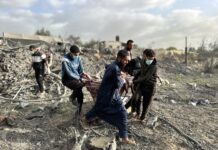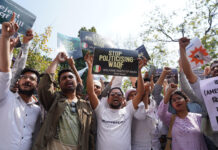Iranian President Hassan Rouhani has said the Saudi government must stop adopting “divisive” polices in the Middle East.
He made the remarks during his speech at the 71st UN General Assembly session in New York today.
Saudi Arabia and Iran are regional rivals and are at odds in Syria, Iraq, Yemen and Lebanon. Riyadh cut diplomatic relations with Iran in January after Iranian protesters attacked Saudi diplomatic missions in Tehran and Mashhad following Riyadh’s execution of a prominent Shia cleric.
“The Saudi government must stop continuing with its divisive policies, disseminating the ideology of hatred and encroaching on the rights of its neighbors, and it must shoulder its responsibility with regards to the life and dignity of [Hajj] pilgrims and found its relations on the basis of mutual respect and accepting responsibility towards regional nations if it seeks a new prospect for its development and the security of the region,” Rouhani said.
He added that for the region to enjoy security and peace, “certain countries in the region must stop bombarding their neighbors and put an end to their support for Takfiri terrorist groups, accept their responsibility and take measures to compensate [for their acts].”
Pointing to the conflicts gripping regional nations, including the people of Syria, Iraq, Yemen, and the Palestinians, Rouhani warned against the unprecedented rise of violence in the Middle East and North Africa.
He described security as a global issue and said over the past years world powers have been advancing different methods of “repression and military intervention” under the pretext of removing security concerns for their people.
Subscribe to our newsletter and stay updated on the latest news and updates from around the Muslim world!
Iran is opposed to sectarianism and any attempt aimed at fomenting sectarian rifts, Rouhani said, warning that certain countries seek to turn religious differences to tense confrontations for their own political gains.
In his speech, Rouhani also criticized the United States for Washington’s “lack of compliance” with a landmark nuclear deal reached with six major powers and Iran in 2015 aimed at curbing Tehran’s nuclear programme in exchange for lifting sanctions.
Iran is pressing the United States to ease banking obstacles to the reopening of trade under the deal.
Major foreign banks are reluctant to get involved because of concerns that they could be caught up in restrictions applying to US banks, which are still banned from doing business with Iran because of core US sanctions that remain in force.
“The lack of compliance with the deal on the part of the United States in the past several months represents a flawed approach that should be rectified forthwith,” Rouhani said.






















